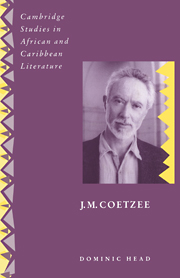Book contents
- Frontmatter
- Contents
- Preface
- List of abbreviations
- Chronology
- 1 The writer's place: Coetzee and postcolonial literature
- 2 Writing violence: Dusklands
- 3 The wrong kind of love: In the Heart of the Country
- 4 An ethical awakening: Waiting for the Barbarians
- 5 Gardening as resistance: Life and Times of Michael K
- 6 The maze of doubting: Foe
- 7 A true confession: Age of Iron
- 8 Producing the demon: The Master of Petersburg
- Notes
- Select bibliography
- Index
8 - Producing the demon: The Master of Petersburg
Published online by Cambridge University Press: 01 March 2010
- Frontmatter
- Contents
- Preface
- List of abbreviations
- Chronology
- 1 The writer's place: Coetzee and postcolonial literature
- 2 Writing violence: Dusklands
- 3 The wrong kind of love: In the Heart of the Country
- 4 An ethical awakening: Waiting for the Barbarians
- 5 Gardening as resistance: Life and Times of Michael K
- 6 The maze of doubting: Foe
- 7 A true confession: Age of Iron
- 8 Producing the demon: The Master of Petersburg
- Notes
- Select bibliography
- Index
Summary
In The Master of Petersburg (1994), Coetzee offers a complex deliberation on authorship, rivalled in metafictional complexity only by Foe among the earlier novels. But, whereas Foe locates a precise moment of postcolonial writing, in ambivalent relationship to the Western literary canon, The Master of Petersburg makes a gesture to extend the broader questions about authorship and responsibility, and the directions for the postmodernist novel, questions which here stem from problems in Dostoevsky's poetics.
The protagonist of Coetzee's novel is Fyodor Dostoevsky himself. The novel opens in October 1869 with the return of this ‘Dostoevsky’ to St Petersburg, following a self-imposed exile in Dresden (he has been avoiding creditors). He returns, travelling on a false passport, to collect the papers and belongings of his stepson Pavel, who has died in mysterious circumstances. The papers, which include a terrorist hit-list, are in the hands of the Tsarist police, with whom Dostoevsky becomes embroiled. He takes up residence in Pavel's former lodgings, eventually commencing an affair with the landlady, whilst becoming fascinated with her adolescent daughter (who had loved Pavel).
There is, as Zinovy Zinik observes, a wilful manipulation of the biographical data: the real Dostoevsky was survived by his stepson, and this significant change signals the novel's preoccupation with the dilemma of ‘fathering’ and authorship. There is also, however, a dependence on actual resonances. At the heart of the novel's narrative development is Nechaev, a real historical figure, a nihilist and revolutionary, associated with the murder of a fellow student, Ivanov, who had left Nechaev's group and could have become an informer.
- Type
- Chapter
- Information
- J. M. Coetzee , pp. 144 - 162Publisher: Cambridge University PressPrint publication year: 1998



